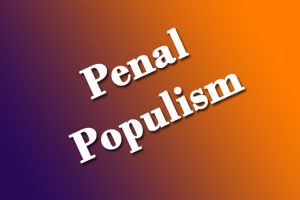di Giovanni Damele

“Penal populism” has become a common expression and a key category among scholars of both political populism and crime and punishment (Shammas 2019, 760). As Victor L. Shammas observes, the term is used “to refer to the ways in which politicians, political parties, and other governing elites present themselves as leading exponents of a politics of ‘law and order’” (Shammas 2019, 760).
Abstract
“Penal populism” has become a common expression and a key category among scholars of both political populism and crime and punishment, and it is often opposed to the concept of “penal elitism”. “Judicial populism” can be considered a sub‐category of the more general category of penal populism inasmuch as it relates to the judicial application of criminal law. Also in this case we may observe a dialectic between “populism” and “elitism”. The judiciary, for instance, can be presented as an agent of moralization, because of its independence and its (purportedly) apolitical nature. Thus, judicial populism is located at the crossroads between penal populism and penal elitism: it shares with penal populism a claim to speak for the people, but this claim is clearly advanced by a technocratic elite.